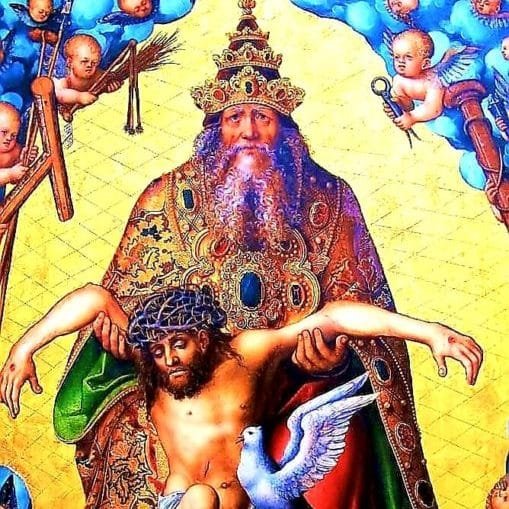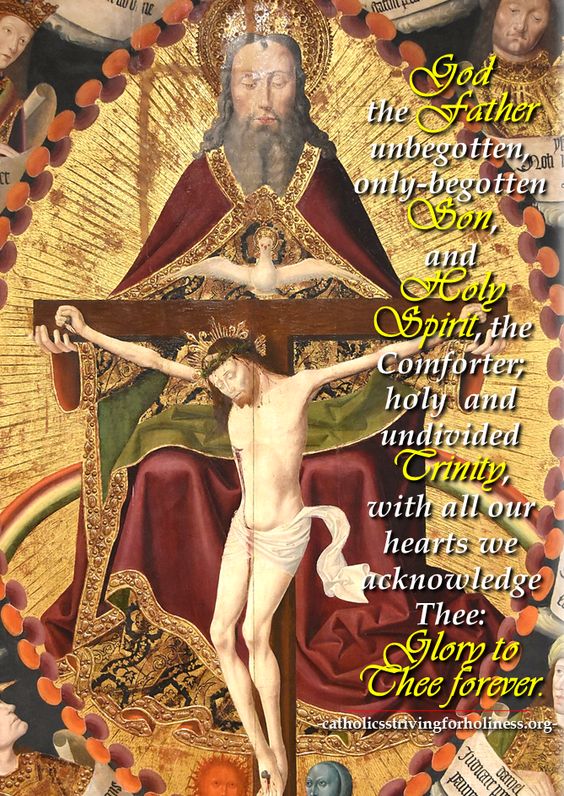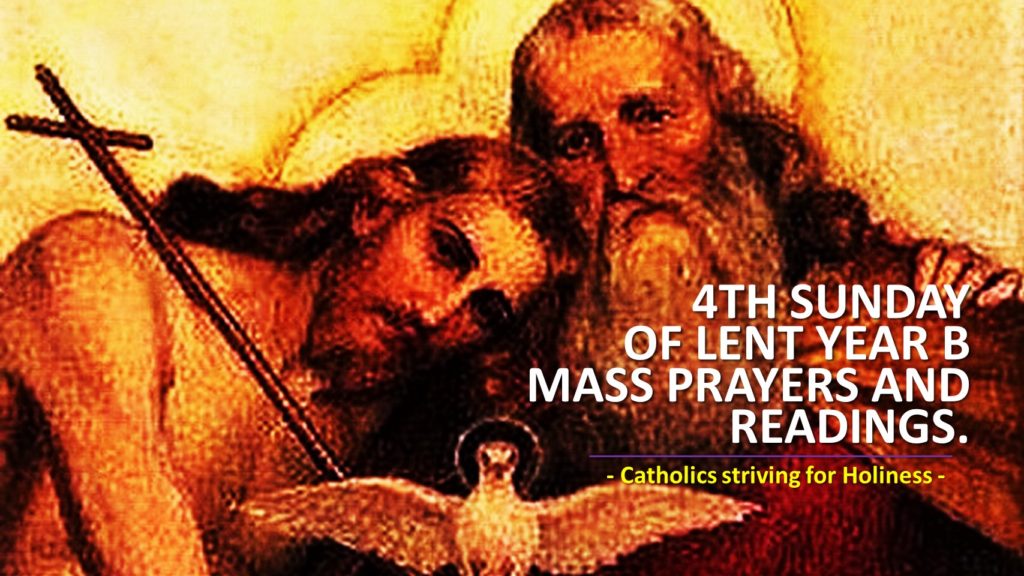POPE BENEDICT XVI’S REFLECTION
4TH SUNDAY OF LENT B (LAETARE SUNDAY).

4th Sunday of Lent B,
ANGELUS ADDRESS, 18 March 2012
Dear Brothers and Sisters,
On our way towards Easter we have reached the Fourth Sunday of Lent. It is a journey with Jesus through the “wilderness”, that is, a time in which to listen more attentively to God’s voice and also to unmask the temptations that speak within us. The Cross is silhouetted against the horizon of this wilderness. Jesus knows that it is the culmination of his mission: in fact the Cross of Christ is the apex of love which gives us salvation. Christ himself says so in today’s Gospel: just “as Moses lifted up the serpent in the wilderness, so must the Son of man be lifted up, that whoever believes in him may have eternal life” (Jn 3:14-15).
The reference is to the episode in which, during the Exodus from Egypt, the Jews were attacked by poisonous serpents and many of them died. God then commanded Moses to make a bronze serpent and to set it on a pole; anyone bitten by serpents was cured by looking at the bronze serpent (cf. Num 21:4-9). Jesus was to be raised likewise on the Cross, so that anyone in danger of death because of sin, may be saved by turning with faith to him who died for our sake: “for God sent the Son into the world, not to condemn the world, but that the world might be saved through him” (Jn 3:17).
St Augustine comments: “So far, then, as it lies with the physician, he has come to heal the sick. He that will not observe the orders of the physician destroys himself. He has come a Saviour to the world… You will not be saved by him; you shall be judged of yourself”. (On the Gospel of John 12, 12: PL 35, 1190). Therefore, if the merciful love of God — who went so far as to give his only Son to redeem our life — is infinite, we have a great responsibility: each one of us, in fact, must recognize that he is sick in order to be healed. Each one must confess his sin so that God’s forgiveness, already granted on the Cross, may have an effect in his heart and in his life.
St Augustine writes further: “God accuses your sins: and if you also accuse them, you are united to God…. When your own deeds will begin to displease you, from that time your good works begin, as you find fault with your evil works. The confession of evil works is the beginning of good works” (ibid., 13: PL 35, 1191).
Sometimes men and women prefer the darkness to the light because they are attached to their sins. Nevertheless it is only by opening oneself to the light and only by sincerely confessing one’s sins to God that one finds true peace and true joy. It is therefore important to receive the Sacrament of Penance regularly, especially during Lent, in order to receive the Lord’s forgiveness and to intensify our process of conversion.
Dear friends, tomorrow we shall be celebrating the solemn Feast of St Joseph. I warmly thank all those who remember me in their prayers on my name day. In particular, I ask you to pray for my Apostolic Journey to Mexico and Cuba, on which I shall be setting out next Friday. Let us entrust it to the intercession of the Blessed Virgin Mary, so beloved and venerated in these two countries which I am preparing to visit.
SOURCE: http://www.vatican.va/content/benedict-xvi/en/angelus/2012/documents/hf_ben-xvi_ang_20120318.html
EMPHASIS MINE.

4th Sunday of Lent B,
HOMILY, 22 March 2009
Dear Cardinals,
Brother Bishops and Priests,
Dear Brothers and Sisters in Christ,
“God so loved the world that he gave his only Son, that whoever believes in him should not perish, but have eternal life” (Jn 3:16). These words fill us with joy and hope, as we await the fulfilment of God’s promises! Today it is my particular joy, as the Successor of the Apostle Peter, to celebrate this Mass with you, my brothers and sisters in Christ from throughout Angola, São Tomé and Príncipe, and so many other countries. […]
Today’s first reading has a particular resonance for God’s people in Angola. It is a message of hope addressed to the Chosen People in the land of their Exile, a summons to return to Jerusalem to rebuild the Lord’s Temple. Its vivid description of the destruction and ruin caused by war echoes the personal experience of so many people in this country amid the terrible ravages of the civil war. How true it is that war can “destroy everything of value” (cf. 2 Chr 36:19): families, whole communities, the fruit of men’s labour, the hopes which guide and sustain their lives and work! This experience is all too familiar to Africa as a whole: the destructive power of civil strife, the descent into a maelstrom of hatred and revenge, the squandering of the efforts of generations of good people. When God’s word – a word meant to build up individuals, communities and the whole human family – is neglected, and when God’s law is “ridiculed, despised, laughed at” (ibid., v. 16), the result can only be destruction and injustice: the abasement of our common humanity and the betrayal of our vocation to be sons and daughters of a merciful Father, brothers and sisters of his beloved Son.
So let us draw comfort from the consoling words which we have heard in the first reading! The call to return and rebuild God’s Temple has a particular meaning for each of us. Saint Paul, the two thousandth anniversary of whose birth we celebrate this year, tells us that “we are the temple of the living God” (2 Cor 6:16). God dwells, we know, in the hearts of all who put their faith in Christ, who are reborn in Baptism and are made temples of the Holy Spirit. Even now, in the unity of the Body of Christ which is the Church, God is calling us to acknowledge the power of his presence within us, to reappropriate the gift of his love and forgiveness, and to become messengers of that merciful love within our families and communities, at school and in the workplace, in every sector of social and political life.
[…] The Gospel teaches us that reconciliation, true reconciliation, can only be the fruit of conversion, a change of heart, a new way of thinking. It teaches us that only the power of God’s love can change our hearts and make us triumph over the power of sin and division. When we were “dead through our sins” (Eph 2:5), his love and mercy brought us reconciliation and new life in Christ. This is the heart of the Apostle Paul’s teaching, and it is important for us to remind ourselves: only God’s grace can create a new heart in us! Only his love can change our “hearts of stone” (cf. Ezek 11:19) and enable us to build up, rather than tear down. Only God can make all things new!
[…]
The words which Jesus speaks in today’s Gospel are quite striking: He tells us that God’s sentence has already been pronounced upon this world (cf. Jn 3:19ff). The light has already come into the world. Yet men preferred the darkness to the light, because their deeds were evil. How much darkness there is in so many parts of our world! Tragically, the clouds of evil have also overshadowed Africa, including this beloved nation of Angola. We think of the evil of war, the murderous fruits of tribalism and ethnic rivalry, the greed which corrupts men’s hearts, enslaves the poor, and robs future generations of the resources they need to create a more equitable and just society – a society truly and authentically African in its genius and values. And what of that insidious spirit of selfishness which closes individuals in upon themselves, breaks up families, and, by supplanting the great ideals of generosity and self-sacrifice, inevitably leads to hedonism, the escape into false utopias through drug use, sexual irresponsibility, the weakening of the marriage bond and the break-up of families, and the pressure to destroy innocent human life through abortion?
Yet the word of God is a word of unbounded hope. “God loved the world so much that he gave his only Son … so that through him, the world might be saved” (Jn 3:16-17). God does not give up on us! He continues to lift our eyes to a future of hope, and he promises us the strength to accomplish it. As Saint Paul tells us in today’s second reading, God created us in Christ Jesus “to live the good life”, a life of good deeds, in accordance with his will (cf. Eph 2:10). He gave us his commandments, not as a burden, but as a source of freedom: the freedom to become men and women of wisdom, teachers of justice and peace, people who believe in others and seek their authentic good. God created us to live in the light, and to be light for the world around us! This is what Jesus tells us in today’s Gospel: “The man who lives by the truth comes out into the light, so that it may be plainly seen that what he does is done in God” (Jn 3:21).
“Live”, then, “by the truth!” Radiate the light of faith, hope and love in your families and communities! Be witnesses of the holy truth that sets men and women free! You know from bitter experience that, in comparison with the sudden, destructive fury of evil, the work of rebuilding is painfully slow and arduous. Living by the truth takes time, effort and perseverance: it has to begin in our own hearts, in the small daily sacrifices required if we are to be faithful to God’s law, in the little acts by which we demonstrate that we love our neighbours, all our neighbours, regardless of race, ethnicity or language, and by our readiness to work with them to build together on foundations that will endure. Let your parishes become communities where the light of God’s truth and the power of Christ’s reconciling love are not only celebrated, but proclaimed in concrete works of charity. And do not be afraid! Even if it means being a “sign of contradiction” (Lk 2:34) in the face of hardened attitudes and a mentality that sees others as a means to be used, rather than as brothers and sisters to be loved, cherished and helped along the path of freedom, life and hope.
Let me close by addressing a special word to the young people of Angola, and to all young people throughout Africa. Dear young friends: you are the hope of your country’s future, the promise of a better tomorrow! Begin today to grow in your friendship with Jesus, who is “the way, and the truth and the life” (Jn 14:6): a friendship nurtured and deepened by humble and persevering prayer. Seek his will for you by listening to his word daily, and by allowing his law to shape your lives and your relationships. In this way you will become wise and generous prophets of God’s saving love. Become evangelizers of your own peers, leading them by your own example to an appreciation of the beauty and truth of the Gospel, and the hope of a future shaped by the values of God’s Kingdom. The Church needs your witness! Do not be afraid to respond generously to God’s call, whether it be to serve him as a priest or a religious, as a Christian parent, or in the many forms of service to others which the Church sets before you.
Dear brothers and sisters! At the end of today’s first reading, Cyrus, King of Persia, inspired by God, calls the Chosen People to return to their beloved land and to rebuild the Temple of the Lord. May his words be a summons to all God’s People in Angola and throughout Southern Africa: Arise! Ponde-vos a caminho!(cf.2 Chr 36:23) Look to the future with hope, trust in God’s promises, and live in his truth. In this way, you will build something destined to endure, and leave to future generations a lasting inheritance of reconciliation, justice and peace. Amen.
© Copyright 2009 – Libreria Editrice Vaticana
http://www.vatican.va/content/benedict-xvi/en/homilies/2009/documents/hf_ben-xvi_hom_20090322_imbisa.html
EMPHASIS MINE.

Fourth Sunday of Lent Year B,
ANGELUS ADDRESS, 26 March 2006
Dear Brothers and Sisters,
This Fourth Sunday of Lent, traditionally known as “Laetare Sunday“, is permeated with a joy which, to some extent, attenuates the penitential atmosphere of this holy season: “Rejoice Jerusalem!”, the Church says in the Entrance Antiphon, “Be glad for her… you who mourned for her”.
The refrain of the Responsorial Psalm echoes this invitation: “The memory of you, Lord, is our joy”.
To think of God gives joy. We spontaneously ask ourselves: but why should we rejoice? One reason, of course, is the approach of Easter. The expectation of Easter gives us a foretaste of the joy of the encounter with the Risen Christ.
The deepest reason, however, lies in the message offered by the biblical readings that the liturgy presents to us today and that we have heard. They remind us that despite our unworthiness, God’s infinite mercy is destined for us. God loves us in a way that we might call “obstinate” and enfolds us in his inexhaustible tenderness.
This is what already emerges from the First Reading from the Book of Chronicles in the Old Testament (cf. II Chr 36: 14-16, 19-23). The sacred author offers us a concise and meaningful interpretation of the history of the Chosen People, who suffered God’s punishment as a consequence of their rebellious behaviour: the temple was destroyed and the people in exile no longer had a land; it truly seemed that God had forgotten them.
Then, however, they saw that God, through punishment, pursues a plan of mercy. It was to be the destruction of the Holy City and the temple – as I said -, it was to be an exile that would move the people’s hearts and bring them back to their God so that they might know him more deeply.
And then the Lord, demonstrating the absolute primacy of his initiative over every purely human effort, was to make use of a pagan, King Cyrus of Persia, to set Israel free.
In the text we have heard, the anger and mercy of the Lord alternate in a dramatic sequence, but love triumphs in the end, for God is love.
How can we fail to grasp from the memory of those distant events a message valid for all times, including our own? In thinking of the past centuries, we can see that God continues to love us even when he punishes us. Even when God’s plans pass through trial and punishment, they always aim at an outcome of mercy and forgiveness.
This is what the Apostle Paul confirmed for us in the Second Reading, recalling that “God, who is rich in mercy, out of the great love with which he loved us, even when we were dead through our trespasses, made us alive together with Christ” (Eph 2: 4-5).
To express this reality of salvation the Apostle, together with the term “mercy”, eleos in Greek, uses the word for love, agape, taken up and further amplified in the most beautiful statement which we heard in the Gospel passage: “God so loved the world that he gave his Only-begotten Son, that whoever believes in him should not perish but have eternal life” (Jn 3: 16).
As we know, that “giving” on the part of the Father had a dramatic development: it even went to the point of the sacrifice of the Son on the Cross.
If Jesus’ entire mission in history is an eloquent sign of God’s love, his death, in which God’s redeeming tenderness is fully expressed, is quite uniquely so. Always, but particularly in this Lenten Season, our meditation must be centred on the Cross. In it we contemplate the glory of the Lord that shines out in the martyred body of Jesus.
God’s greatness, his being love, becomes visible precisely in this total gift of himself. It is the glory of the Crucified One that every Christian is called to understand, live and bear witness to with his life.
The Cross – the giving of himself on the part of the Son of God – is the definitive “sign” par excellence given to us so that we might understand the truth about man and the truth about God: we have all been created and redeemed by a God who sacrificed his only Son out of love.
This is why the Crucifixion, as I wrote in the Encyclical Deus Caritas Est, “is the culmination of that turning of God against himself in which he gives himself in order to raise man up and save him. This is love in its most radical form” (n. 12).
How should we respond to this radical love of the Lord?
The Gospel presents to us a person by the name of Nicodemus, a member of the Sanhedrin of Jerusalem who sought out Jesus by night. He was a well-to-do man, attracted by the Lord’s words and example, but one who hesitated to take the leap of faith because he was fearful of others. He felt the fascination of this Rabbi, so different from the others, but could not manage to rid himself of the conditioning of his environment that was hostile to Jesus, and stood irresolute on the threshold of faith.
How many people also in our time are in search of God, in search of Jesus and of his Church, in search of divine mercy, and are waiting for a “sign” that will touch their minds and their hearts!
Today, as then, the Evangelist reminds us that the only “sign” is Jesus raised on the Cross: Jesus who died and rose is the absolutely sufficient sign. Through him we can understand the truth about life and obtain salvation.
This is the principal proclamation of the Church, which remains unchanged down the ages.
The Christian faith, therefore, is not an ideology but a personal encounter with the Crucified and Risen Christ. From this experience, both individual and communitarian, flows a new way of thinking and acting: an existence marked by love is born, as the saints testify.
Dear friends, this mystery is particularly eloquent in your parish, dedicated to “God, the merciful Father”. It was desired, as we well know, by my beloved Predecessor John Paul II in memory of the Great Jubilee of the Year 2000, to effectively condense that extraordinary spiritual event.
In meditating on the Lord’s mercy that was revealed totally and definitively in the mystery of the Cross, the text that John Paul II had prepared for his meeting with the faithful on 3 April, Sunday in Albis, the Second Sunday of Easter last year, comes to my mind.
In the divine plans it was written that he would leave us precisely on the eve of that day, Saturday, 2 April – we all remember it well -, and for that reason he was unable to address his words to you. I would like to address them to you now, dear brothers and sisters. “To humanity, which sometimes seems bewildered and overwhelmed by the power of evil, selfishness and fear, the Risen Lord offers his love that pardons, reconciles and reopens hearts to hope. It is a love that converts hearts and gives peace”.
The Pope, in this last text which is like a testament, then added: “How much the world needs to understand and accept Divine Mercy!” (Regina Caeli Reflection, read by Archbishop Leonardo Sandri, Substitute of the Secretariat of State, to the faithful gathered in St Peter’s Square, 3 April 2005; L’Osservatore Romano English Edition, 6 April, p. 1, n. 2).
To understand and accept God’s merciful love: may this be your commitment, first of all in your families and then in every neighbourhood milieu. […]
I know, moreover, that because of its original architectural structure, your church attracts many visitors. Make them appreciate not only the particular beauty of this sacred building, but especially the riches of a lively Community, eager to witness to the love of God, the merciful Father. That love is the true secret of Christian joy to which today, Laetare Sunday, invites us.
As we turn our gaze to Mary, “Mother of holy joy”, let us ask her to help us deepen the reasons for our faith, so that, as today’s liturgy urges us, renewed in the spirit and with a joyful heart, we may respond to the eternal and boundless love of God.
Amen!
© Copyright 2006 – Libreria Editrice Vaticana
http://www.vatican.va/content/benedict-xvi/en/homilies/2006/documents/hf_ben-xvi_hom_20060326_parrocchia-roma.html
EMPHASIS MINE.
Stay updated: subscribe by email for free TO OUR NEW WEBSITE www.catholicsstrivingforholiness.org (PUT YOUR EMAIL IN THE SUBSCRIBE WIDGET).
We are also in www.fb.com/Catholicsstrivingforholiness. Kindly help more people in their Christian life by liking our page and inviting your family, friends and relatives to do so as well. Thanks in advance and God bless you and your loved ones! Fr. Rolly Arjonillo


